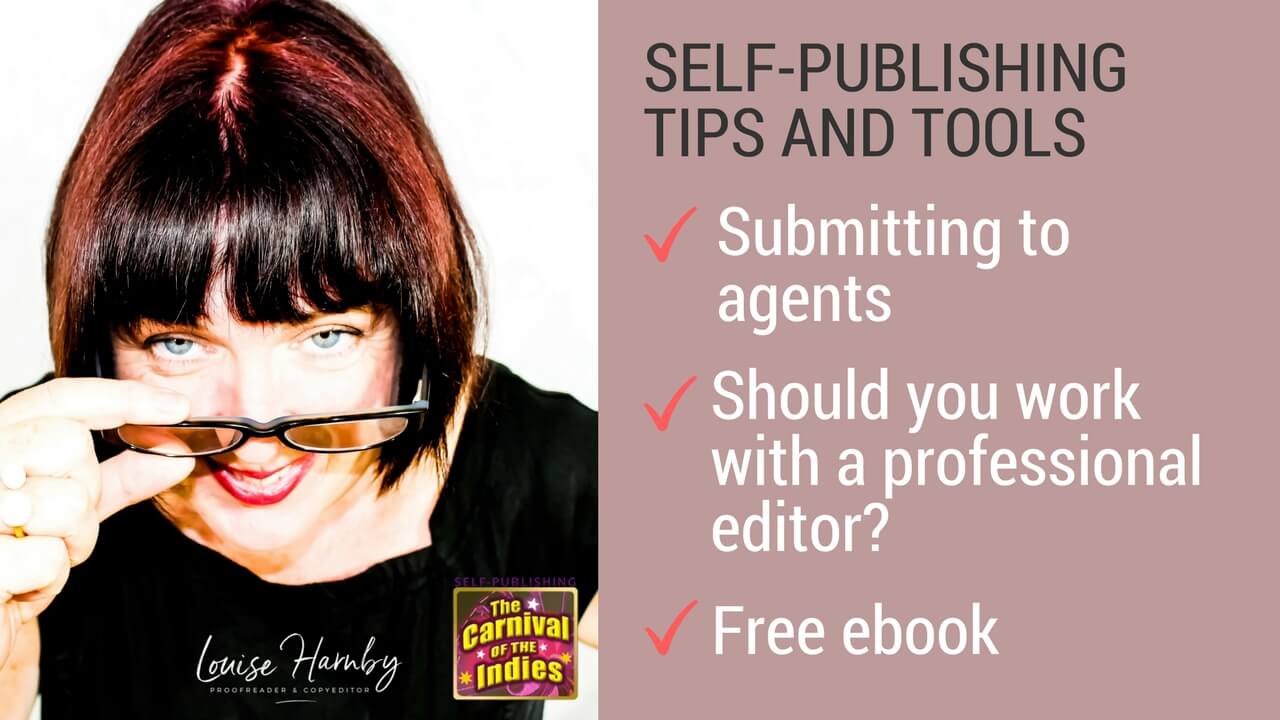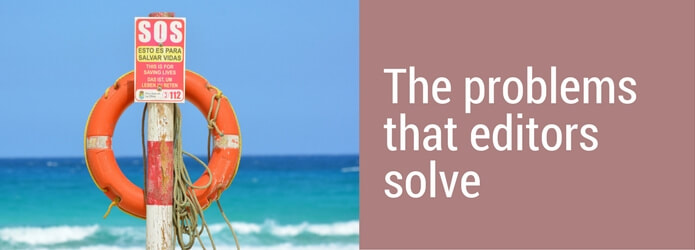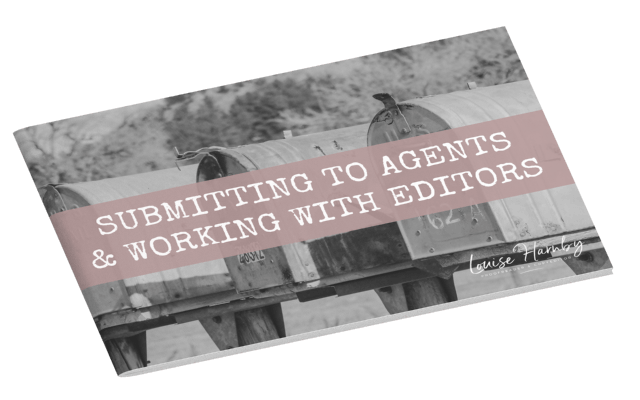|
Most of the writers who ask for my help have elected to self-publish. Our conversations don’t leave me feeling conflicted. The writer has a problem and we focus on whether I can solve it, when they want me to do this, and what it will cost.
But every few months or so, the discussion becomes complicated and my initial response is novel-length. Why? Because my writer wants me to copyedit or proofread prior to agent submission.
This post featured in Joel Friedlander's Carnival of the Indies #87
It’s high time I put my thoughts and findings down in one place. If you’re a writer or an editor (especially a beginner) who’s feeling flummoxed, here’s some direction.
Editing prior to submission: First principles Here are four things that writers and editors should be mindful of at the outset:
What problems do editors solve?
An editor, broadly speaking, is someone who helps prepare written material for publication. However, that prep doesn’t happen in one hit. Think of it like a Sunday roast – if you start cooking the carrots at the same time as the meat, you’ll end up with a tender joint and a pile of orange mush … or sweet veg and something that belongs in a field not on your plate. The editorial process is not so different – there are lots of things to do but the order and timing of each stage is critical. If you’re a writer and you’re considering hiring an editor prior to submission, think first about what’s worrying you and what might scupper your submission:
All of the following are types of editor but their intentions (and the outcomes) are different:
Some editors offer all of these services, some only one or two. Those who offer multiple stages might do a couple at the same time (e.g. line editing and copyediting) but I know of none who offer all four simultaneously.
Let’s revisit our list of seven problems and match them with an editor:
Bear in mind that editors customize their services – what one person includes in a copyedit might be restricted to another’s line edit. Don’t be afraid to ask for specifics so that you have a mutual understanding of what’s included. ‘But I don’t know what my problems are.’ It’s all very well for experienced agents and editors to say you need X but not Y, but that doesn’t necessarily help the author.
Fair enough, but what if we’re not talking about a few typos? What if we’re talking about a novel that has a wonderful plot, is beautifully paced and features enthralling characters but, line by line, the narrative is overwritten and so fraught with grammar, spelling and punctuation mistakes that it’s frustrating and unpleasant to read? All the good stuff is buried beneath the blunders. On the flip side, let’s imagine that a writer decides to make sure the book’s in tip-top condition at sentence level but the characters are one shade of grey and the plot’s plopped. In both cases, there’s just too much for an agent to do. And that’s why the yes/no approach to the question of whether a writer should seek professional editorial help prior to submission is problematic. Agent Steve Laube sums up the issue nicely: Our agency consistently sees proposals that are okay, but simply not written at a level that is needed to break into the market. Agents are not freelance editors so there is only so much we are willing to do to fix a project. I have said it this way, ‘If I get something that is 90% ready, I can take it the rest of the way. But if it is only 80% ready I will kick it back to the writer with a rejection. We are looking for the best of the best.' (‘Should You Hire a Freelance Editor?‘)
Finding out whether you’re ready – the order of play
So how do you find out whether you’re 90% there? I had intended to visit my Sunday Roast metaphor but Jane Friedman says it so much better: [N]ever hire a copyeditor until you’re confident your book doesn’t require a higher level of editing first. That would be like painting the walls of your house right before tearing them down. (‘Should You Hire a Professional Editor?’)
I couldn’t agree more. Recall the types of editors I listed above in ‘What problems do editors solve?’. I deliberately staged them because there’s a hierarchy. The hierarchy isn’t based on importance but on logic.
There’s no point in having a line editor and copyeditor tighten up your narrative if the point of view is a catastrophe; nor is it worth spending hundreds of pounds to ensure that your dialogue is punctuated according to industry standards if the characters giving voice to those words are under-developed. With that in mind, start with the big picture – a manuscript evaluation, critique or a mini developmental edit. This kind of work involves a specialist editor reviewing your book and identifying strengths and weaknesses. It’s not a full-on fix but it will show you how to move forward so that you can improve the book before you submit. As editor Sophie Playle points out: Agents and publishers are most interested in a great story that’s told well (it’s all about that ‘unique voice’) and that they can take an educated gamble on selling. The writing can be polished at a later stage, but story, voice and market potential are the key things here. (‘Where is Your Budget for Book Editing Best Spent?‘)
Sarah Davies of Greenhouse Literary concurs:
An editor who can help you structure your story, develop characterization and voice, and iron out major problems could be a good idea, if you see yourself as an apprentice learning your writing craft. […] A line editor, who’s all about punctuation and small-scale phrasing, probably isn’t worth it. At the point of submission, agents and editors are looking more at the story as a whole. (‘Should You Hire an Editor Before Querying? Agents Weigh In!‘)
If you’re an experienced writer, that might be enough. If the evaluation identifies major problems, you might decide to invest in a full developmental edit, but at least your decision will be informed.
Editor and writing coach Lisa Poisso offers three additional reasons to hire an editor prior to submission:
The right mindset to working with an editor
Literary agent Rachelle Gardner has the following advice on mindset: Using a freelance editor can be a great idea – if you use it as a learning experience. You need to do most of the work yourself. I think it’s wasted money if you’re counting on someone to fix your manuscript for you. The point is to get an experienced set of eyes on it to help you identify problems and figure out how to fix them. (‘Should I Hire a Freelance Editor?’)
Gardner’s referring to big-picture work here – developmental editing. She nails two important points:
And here’s Nicola Morgan (Write to be Published, p. 179): [I]f you are thinking of getting a professional editor to perfect your work before submitting it, you are treading a tricky line.
Gardner and Morgan remind us that if you hire an editor for book one, submit and get a publishing contract, you’ll need to do it for your next book, and the one after, and so on. Over time, you’ll become less dependent on an editor as your novel craft grows, but it won’t happen in one book.
So, let’s take a quick breather and summarize:
Finding the right editor – what to tell and what to ask
Talk to more than one editor so you can get a feel for what’s on offer and whether they’re a good fit. An editor will need to know the following:
This information will help the editor work out whether their services are appropriate for you.
Answers to these questions will help you to work out whether their service offering matches your goals.
Through the editor’s lens – mindful pre-submission support
Should editors work with writers submitting to agents even though a publisher will likely take a book through the editing process? It depends. If you’re a specialist developmental editor who understands story craft and what makes a book attractive to agents and publishers, then yes, absolutely. You can be part of that learning process that Gardner and Morgan discuss, someone who helps the writer put their best foot forward in a competitive market. What about if you’re a sentence-level specialist like me? I think we need to tread mindfully.
I don’t take a yes/no approach to this. Sometimes I accept the work and sometimes I advise the author to take another path. Here are four short case studies featuring writers who asked me for copyediting prior to submission: Case study A The sample was beautifully written (to my copyeditor’s eye) – engaging from the get-go. I could see clearly how I’d amend the minor spelling, grammar and punctuation errors but they in no way impeded the book’s readability. I would have loved to copyedit that book but I cautioned the author to hold off, do some research into her chosen agents’ requirements and consider a critique first. She took my advice. Case study B The sample was gorgeous – moved me to tears, in fact. However, English was the author’s second language and the book was severely impaired at sentence level. I was able to identify how I’d smooth and correct the narrative but advised her on the order of play and recommended higher-level editing first. She insisted that the structural work was complete, that she’d gone as far as she wished, and that she’d self-publish if she was unsuccessful in securing representation. I did a sample edit, we agreed terms and I spent a blissful month line editing and copyediting for her. Case study C The sample was problematic – I couldn’t get under the skin of the thing. The writing seemed flat, like a textbook rather than a work of fiction. The spelling, grammar and punctuation needed a little work though the errors didn’t impede readability. I could have copyedited that book but it wouldn’t have made any difference – even though I’m not a developmental specialist, I knew the book wasn’t agent-ready. I gently advised the author of my concerns and suggested some structural-level options (and colleagues who could assist him). Despite my advice, he expressed a preference to go ahead with copyediting. I declined, wished him well and walked away. Case study D The sample was strong – the author had worked intensively with an agent to knock the book into shape. He was looking for a once-over to check for howlers, sloppy punctuation, gaping plot holes and a general tidy-up. His agent had recommended he commission a copyeditor to give him the best chance of securing a publishing contract. I didn’t hesitate to quote. But I'm an indie author. Why is agent submission relevant? Even self-publishers can benefit from agent submission. The Alliance of Independent Authors (ALLi) partners with Toby Mundy Associates (TMA) agency to sell translation and other subsidiary rights for self-published authors. Says Mundy: An agent can help develop new markets, maybe in English-language territories where self-publishing isn’t delivering good results or in translation. They can help with career planning and development. And they can help develop hybrid models, combining indie and traditional publishing. As Orna Ross, ALLi Director has said elsewhere, “Being a successful indie author means doing whatever is best for your book(s), within the bounds of what’s possible at a particular time. Sometimes that’s self-publishing, sometimes trade-publishing, often a mix of both.”
Even if you're self-publishing, the right agent will be able to help you with specialist support.
Summing up There’s no right or wrong when it comes to an editor and an author working together prior to submission. What’s crucial is that the decisions made are informed – based on an understanding of the different levels of editing and the order of play. That applies to authors and editors. Authors need to focus on the big picture first, then follow up with sentence-level work if the problems are severe enough to frustrate an agent or a publisher. Editors need to be transparent about their specialist skills and mindful of the author’s preferences, but also be prepared to walk if they believe that their input would be without purpose.
Think you might like to revisit this advice? Visit the Books and Videos page in my resource library to download this free booklet.
Louise Harnby is a line editor, copyeditor and proofreader who specializes in working with crime, mystery, suspense and thriller writers.
She is an Advanced Professional Member of the Chartered Institute of Editing and Proofreading (CIEP), a member of ACES, a Partner Member of The Alliance of Independent Authors (ALLi), and co-hosts The Editing Podcast. FIND OUT MORE > Get in touch: Louise Harnby | Fiction Editor & Proofreader > Connect: Twitter at @LouiseHarnby, Facebook and LinkedIn > Learn: Books and courses > Discover: Resources for authors and editors
10 Comments
27/11/2017 08:17:24 am
This is brilliant, I am going to share madly. In fact, I think I'm going to re-blog it if you don't mind; I can't do that automatically because you're not on WordPress, too, but I'll put a few (non-identical to yours) words and a big, enthusiastic link on my blog later in the week, because you've said all the stuff and included all the links.
Reply
Louise Harnby
27/11/2017 11:11:04 am
Thanks, Liz! Glad you liked it! That's exactly why I wanted it all in one place. The more we can do to help authors navigate the tricky learning curve of either self-publishing or working with agents towards a trad publishing contract the better!
Reply
27/11/2017 04:26:13 pm
Oh my! This is excellent!
Reply
Louise Harnby
27/11/2017 05:58:34 pm
You are very welcome indeed, Maria! Glad you found it useful. Your comment about editor-speak was interesting. It's so important that editors acknowledge the fact that what's common parlance to us might not be so for writers, especially those who are at the beginning of their publishing journey. Really glad you found this useful!
Reply
6/2/2018 08:09:29 pm
Wow! This is going in my resource file. Tons of excellent information for writers. Thank you for sharing this at #WriterWednesday hope to see you each Wednesday.
Reply
Louise Harnby
6/2/2018 09:33:08 pm
Thank you so much, Evelyn! And for inviting me to #WriterWednesday. I'm looking forward to it!
Reply
Louise Harnby
8/2/2018 11:39:39 am
Thanks, Jess. To be honest, not everyone uses the same terminology. So a copyeditor might include what I call line editing in their copyediting service (I often push the two together if a project requires it). The definitions are often tangled in this industry!
Reply
21/9/2022 09:14:35 am
As a freelancer, I had no idea how much work goes into getting your work to the next level.
Reply
9/2/2023 02:23:05 pm
I was unaware that there were various categories of editors. I'm definitely a overwrite, therefore I suppose I should look into hiring a line editor. Thanks a lot.
Reply
Your comment will be posted after it is approved.
Leave a Reply. |
BLOG ALERTSIf you'd like me to email you when a new blog post is available, sign up for blog alerts!
TESTIMONIALSDare Rogers'Louise uses her expertise to hone a story until it's razor sharp, while still allowing the author’s voice to remain dominant.'Jeff Carson'I wholeheartedly recommend her services ... Just don’t hire her when I need her.'J B Turner'Sincere thanks for a beautiful and elegant piece of work. First class.'Ayshe Gemedzhy'What makes her stand out and shine is her ability to immerse herself in your story.'Salt Publishing'A million thanks – your mark-up is perfect, as always.'CATEGORIES
All
ARCHIVES
July 2024
|
|
|
|























 RSS Feed
RSS Feed





